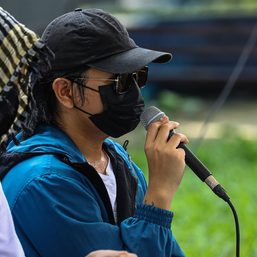SUMMARY
This is AI generated summarization, which may have errors. For context, always refer to the full article.
![[OPINION] Is stealthing a crime in the Philippines?](https://www.rappler.com/tachyon/2022/12/ispeak-stealthing-1280x720-1.png)
In the era of #MeToo, more people have come to understand that consent to sex should be given freely, willingly, and enthusiastically. Only yes means yes, and that means knowing exactly what we’re saying yes to. This includes using contraception.
Stealthing is defined as the non-consensual act of removing contraception during sexual activity without the awareness or consent of the other person or people involved. It can also be done by damaging a condom without the other person’s or people’s knowledge or consent.
Anyone can be a victim of stealthing. While the term was initially understood to refer to cisgender men removing or damaging a condom prior to or in the middle of penetrative anal or vaginal sex, it can also be used to refer to the removal or damaging of any barrier used in any sexual activity. This means that all people, regardless of their sexual orientation, gender identity or expression, or sex characteristics (SOGIESC), can be victims of stealthing.
No law punishing stealthing in the Philippines?
There is currently no law explicitly punishing stealthing as a crime. The Supreme Court, whose decisions are considered law, has likewise not dealt with any case on stealthing.
This has led many to believe stealthing is not a crime in the Philippines. House Bill No. 3957, or the Anti-Stealthing Law, was filed by AKO BICOL Party-List Representatives Alfredo Garbin and Elizaldy Co in 2019, categorizing stealthing as a form of sexual assault. The bill imposes penalties of imprisonment ranging from 12 years to 40 years, as well as fines ranging from P100,000 to P5 million. However, it was never passed into law.
Despite this, there may already be a law punishing stealthing. Act No. 3815 or the Revised Penal Code (RPC), as amended by Republic Act No. 8353 or the Anti-Rape Law and Republic Act No. 11648, punishes the commission of rape and sexual assault by means of fraudulent machination.
In the 2014 case of People v. Quintos (G.R. No. 199402, November 12, 2014), the Supreme Court described rape by fraudulent machination as instances wherein the victim is “induced” to have sex, such that they are “not in full control of [their] decisions.” It occurs when a person acts “without full or with false knowledge of the circumstances” from which they base their actions. As a result, any consent they give is either false or not their own. It was also stated that any lack of resistance should not be interpreted as voluntariness.
While the Quintos case did not deal with stealthing, the deceitful act of removing or damaging contraception falls within the definition of fraudulent machination given by the Court. Through stealthing, one of the parties induces another to engage in sexual activity on a false premise – that they would be protected by a condom or other contraceptive. The use of a contraceptive prevents sexually transmitted infections and unwanted pregnancies. It is highly likely that the other party would not have consented to sexual intercourse without contraception. Removing the contraceptive without the other party’s knowledge or consent thus changes the conditions they agreed to and violates the other’s consent. Following the Quintos case, the victim’s act cannot be considered voluntary if they were not aware of or did not consent to the other party not using contraception.
Arguably, therefore, the RPC is already sufficient to convict a perpetrator of rape or sexual assault for stealthing. This interpretation would accord important protections to vulnerable persons, as there would now be legal redress for victims of stealthing.
The legal framework of stealthing
Stealthing impinges on a person’s freedom to consent to sex. It is an exercise of control and power by one party over the other, as it takes away the latter’s capacity to make informed decisions over their own body. Studies have also shown that women and LGBTQ+ persons are the likely victims of stealthing. This demonstrates that stealthing is often an act of misogyny, whereby men impose their will on their sex partners. It is a manifestation of the unequal power dynamics between and among genders, which the law should not allow.
Notably, the 1987 Constitution states in Article II, Section 14 that the State recognizes the fundamental equality before the law of men and women. An interpretation of the RPC that aims to address a crime that is a manifestation of gender inequality would thus be in keeping with this constitutional mandate.
The international agreements to which the Philippines is a party also oblige us to take measures toward eliminating this form of gender-based violence. The Philippines is bound by several human rights treaties, such as the International Covenant on Economic, Social, and Cultural Rights (ICESCR) and the Convention on the Elimination of All Forms of Discrimination Against Women (CEDAW). These treaties recognize the inherent dignity of all human beings and seek to guarantee their fundamental freedoms. In particular, Article 3 of the ICESCR embodies the principle of non-discrimination, as it obliges States to ensure the equal right of men and women to the enjoyment of all the rights in the said treaty. Similarly, Article 3 of the CEDAW requires States to take measures to guarantee women the exercise and enjoyment of human rights and fundamental freedoms on a basis of equality with men. Article 2 of the CEDAW also mandates the Philippines to modify or abolish existing laws, regulations, customs, and practices which constitute discrimination against women. The proposed reading of the RPC recognizing stealthing as a crime would be a step towards fulfilling these obligations under international law.
Keeping up with the times
The Philippines would certainly not be alone in recognizing stealthing as a crime. Courts in Canada, Germany, New Zealand, and the United Kingdom have convicted perpetrators of rape by means of stealthing. The state of California in the United States has passed a law criminalizing non-consensual condom removal.
The Philippines may never pass an anti-stealthing law. Our legislative system is slow and dependent on political will and other unpredictable factors. Fortunately, we may not need that law. The RPC could already give victims of stealthing the avenue they need to obtain justice. We should use the legal tools we already have to protect those who have undergone this egregious violation of consent. – Rappler.com
Marianne Crielle Vitug is a human rights lawyer, law lecturer, development worker, and feminist.
Add a comment
How does this make you feel?




![[Rappler Investigates] Sexual harassment by the boss](https://www.rappler.com/tachyon/2024/02/sexual-harassment-by-the-boss-02292024.jpg?resize=257%2C257&crop=414px%2C0px%2C1080px%2C1080px)

There are no comments yet. Add your comment to start the conversation.